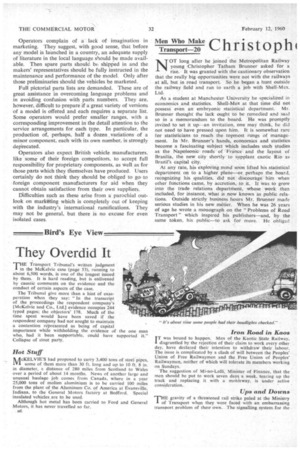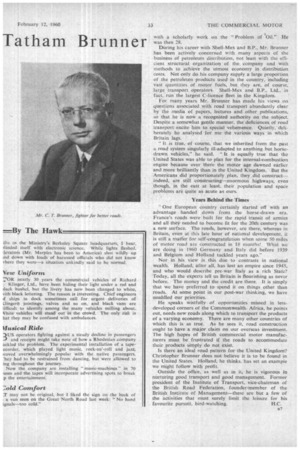They Overdid It
Page 40

Page 41

If you've noticed an error in this article please click here to report it so we can fix it.
THE Transport Tribunal's written judgment in the McKeivie case (page 53), running to about 6,500 words, is One of the longest issued by them. It is hard reading, but is enlivened by caustic comments on the evidence and the conduct of certain aspects of the case.
The Tribunal give more than a hint of exasperation when they say: In the transcript of the proceedings the respondent company's (McKelvie and Co., Ltd.] evidence occupies 244 typed pages; the objectors' 178. Much of the time spent would have been saved if the respondent company had not sought to maintain a contention rePresented as being of capital importance while withholding the evidence of the one man who, had it been supportable. could have supported it." Collapse of stout party.
Hot Stuff
NAcKELVIES had proposed to carry 3,400 tons of steel pipes, al some of them more than 30 ft. long and up to 10 ft. 8 in. in diameter, a distance of 2.110 mites from Scotland to Wales over a period of about 14 months. News of another large and unusual haulage job comes from Canada, where in a year 25,000 tons of molten aluminium is to be carried 100 miles from the plant of the Aluminum Co. of America at Evansville, Indiana, to the General Motors factory at Bedford. Special insulated vehicles are to be used.
Although hot metal has been carried to Ford and General Motors, it has never travelled so far.
146
Iron Road in Kaos
iT was bound to happen. Men of the Kaotic State Railway, disgruntled by the rejection of their claim to work every other day, have declared their intention to withdraw their labour. The issue is complicated by a clash of will between the Peoples' Union of Free Railwaymen and the Free Union of Peoples' Railwaymen, neither of which will tolerate its members working on Sundays.
The suggestion of Mi-no-Lolli, Minister of Finance, that the men should be put to work seven days a week, tearing up the track and replacing it with a inotdrway, is Under active consideration.
Ups and Downs
THE gravity of a threatened rail strike paled at the Ministry of Transport when they were faced with an embarrassing transport problem of their own. The signalling system for the with a scholarly work on the Problem of *OW" He was then 28.
During his career with Shell-Mex and B.P., Mr, Brunner has been actively concerned with many aspects of the business of petroleum distribution, not least with the efficient structural organization of the, company and with methods to achieve the utmost economy in distribution costs. Not only do his company supply a large proportion of the petroleum products used in the country, including vast quantities of motor fuels, but they are, of course, large transport operators. Shell-Mex and B.P., Ltd., in fact. run the largest C-licence fleet in the Kingdom.
For many years Mr. Brunner has made his views oft questions associated with road transport abundantly clear by the media of papers, lectures and other publications, so that he is now a recognized authority on the subject. Despite a somewhat gentle manner, the deficiences of road transport excite him to special vehemence. Quietly: deliberately he analysed for me the various ways in which Britain lags.
" it is true, of course, that we inherited from the past a. road system singularly ill-adapted to anything but horsedrawn vehicles," he said. "It is equally true that the United States was able to plan for the internal-combustion engine because over there the motor age dawned earlier and more brilliantly than in the United Kingdom. Bu the Americans did proportionately plan, they did construct— indeed, are still constructing—enormous highways, even though, in the east at least, their population and space problems are quite as acute as ours.
Years Behind the Times " One European country certainly started off with an advantage handed down from the horse-drawn era. France's roads were built for the rapid transit of armies and all they needed to become lit for the 20th century was a new surface. The roads, however, are there, whereas. in Britain, even at this late hour of national development, it is still a matter for self-congratulation when some 50 miles of motor road are constructed in 18 months! What we are doing in 1960 Germany and Italy did before 1939 and Belgium and Holland tackled years ago."
Nor in his view is this due to contrasts in national wealth. Holland, after ail, has lost an empire since 1945, and who would describe pre-war Italy as a rich State? Today, all the experts tell us Britain is flourishing as never before. The money and the credit are there. It is simply that we have preferred to spend it on things other than roads. At some point in our post-war thinking, we have muddled our priorities.
He speaks wistfully of opportunities. missed in lessdeveloped corners of the Commonwealth. Africa, he points out, needs new roads along which to transport the products of a varying economy. There are many other countries of which this is as true. As he sees it, road construction ought to have a major claim on our overseas investment. The high hopes of British commercial motor manufacturers must be' frustrated if the roads to accommodate their, products simply do not exist.
Is there an ideal road pattern for the United Kingdom'? Christopher Brunner does not believe it is to be found in the United States. Holland, he thinks, has set an example we might follow with profit.
Outside the office, as well as in it he is vigorous in nurturing good transport and good management. Former president of the Institute of Transport, vice-chairman of the British Road Federation, founder-member of the British Institute of Management—these are but a few of the activities that must surely limit the leisure for his
favourite pursuit, bird-watching. H.C.




















































































































